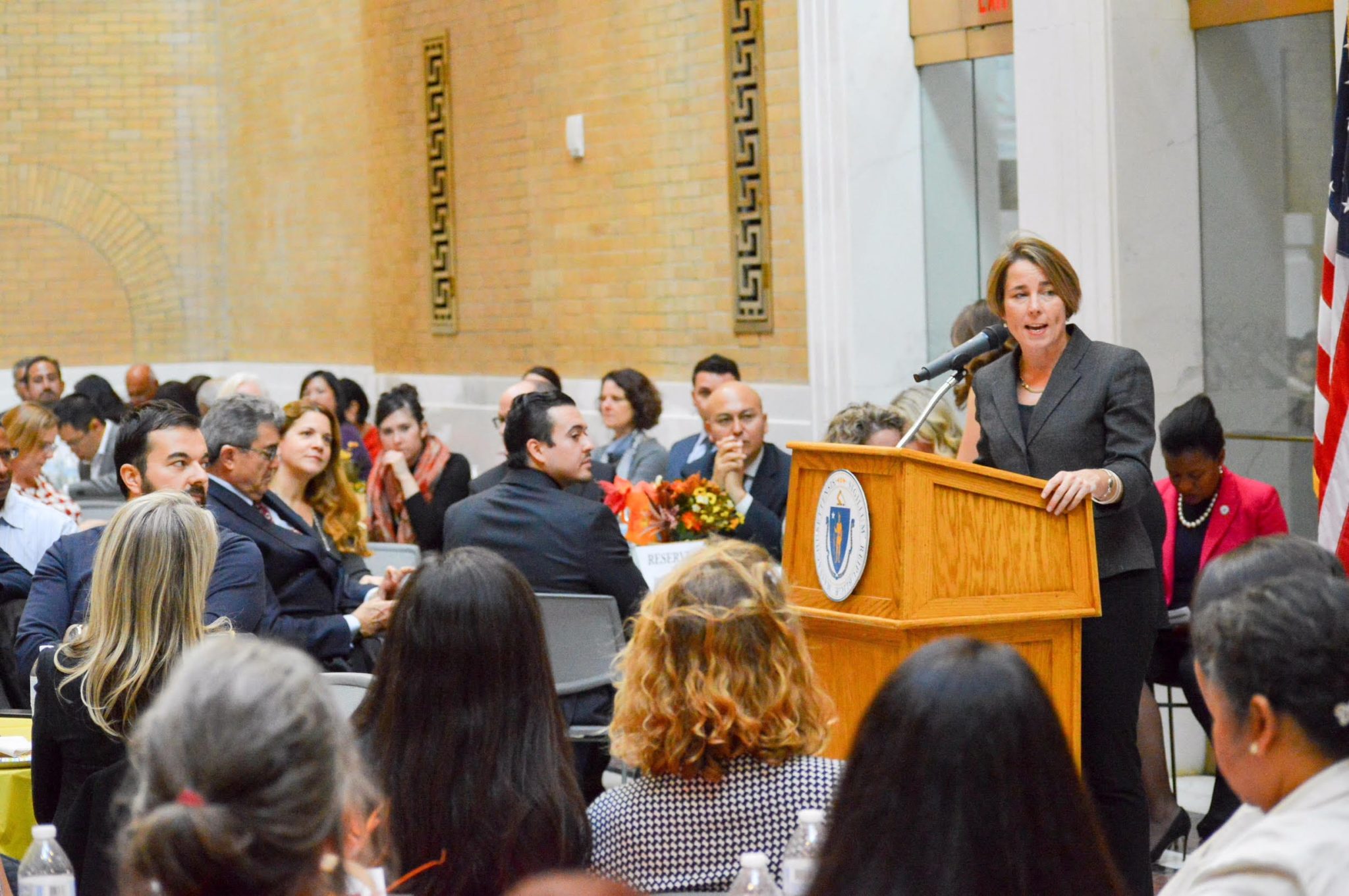By Tim Cronin, Policy Associate
Anyone following Massachusetts politics has undoubtedly come across Attorney General Maura Healey. Young and progressive, Healey has cut her teeth in the early days of the Trump administration, leading multi-state legal challenges in support of DACA, Net Neutrality, the Affordable Care Act, and more.
Closer to home, Attorney General Healey is emerging as the champion for another cause: clean energy.
Recent actions by her office have sought to protect energy customers by promoting clean energy policies. In doing so Attorney General Healey has distinguished herself from Governor Baker, and has risen to become the state’s leading champion for clean energy policies.
Below are some examples of stances Healey has taken in support of clean energy.
NORTHERN PASS & CLEAN ENERGY PROCUREMENT
A 2016 Clean Energy Bill set worth a process for Massachusetts to procure 1.2 MW of non-state clean energy and an additional 1.6 MW of offshore wind.In the past year the state has moved forward with their RFP and procurement projecting, selecting the controversial Northern Pass project that imports hydroelectricity from Canada. Recently, a New Hampshire committee rejected the necessary permits Northern Pass to be built throwing the project’s future into uncertainty.
On Tuesday AG Healey came out against the Baker administration, calling for it to take a more active role in ensuring the success of the massive clean energy project. Healey argues that instead of empowering state regulators to oversee the process, Governor Baker has given exclusive control of the process to the very utilities that stand to benefit from the project.
AG Healey has also used her oversight power in the process, via an independent evaluator, to force the Department of Energy Resources (DOER) and utilities to be more transparent in all upcoming deliberations on the topic.
EVERSOURCE RATE CASE
The so-called ‘Eversource Rate Case’ is a decision by the Department of Public Utilities (DPU) that increases rates for future solar customers in a large part of Massachusetts. The DPU’s decision is likely to hurt residential solar development in the Eversource service region for years to come.
Throughout the deliberations AG Healey expressed strong opposition to the rate increase, pointing out how counter intuitive it was to essentially increase rates as shareholder profits hit 10%. After the DPU’s decision AG HEaley was the first to appeal, and has sought multiple legal angles to overturn the decision. This includes a successful action that requires utilities to pass on federal tax cut savings back to Massachusetts ratepayers.
REGIONAL ELECTRIC UTILITIES & ISO-NE
As New England states, including Massachusetts, continue to increase their renewable energy capacity the region’s inter-state grid regulator (ISO-NE) has raised questions about the reliability of the grid. ISO-NE’s fear is that the regional wholesale electric market will not be able to function properly with so much clean energy operating in it.
ISO-NE’s solution is to establish a two-tiered wholesale energy market for New England, with renewables competing against each other in a lower value market. The effect on regional, and Massachusetts, renewable energy policy would be devastating. The Baker administration has joined only two other states in favor of the regulator’s proposal for a two-tier market.
AG Healey has joined environmental groups in opposing splitting the wholesale market. In addition to its effects on clean energy development, Healey has argued that it would create “pay twice for the same capacity.”
EXPANSION OF GAS & OIL
AG Healey has also come out against claims from energy companies that Massachusetts needs additional natural gas infrastructure to keep energy prices affordable. In a study commissioned and published by her office found that additional construction was not necessary. Additionally, Healey’s study found that cheaper, cleaner alternatives to new gas pipelines had the ability to meet the state’s worst case power scenarios.
She has also come out against the Trump administration’s proposal to expand offshore drilling. In doing so AG Healey led a coalition of 12 state Attorneys General to explore legal action against President Trump’s Interior Secretary.
NEXT STEPS FOR HEALEY
An interesting possibility for state leaders to assist AG Healey would be to increase the power of her state constitutional office to investigate and advocate for clean energy. As it stands, currently, her office must rely on legal workarounds to push for clean energy, as opposed to explicit legal tools. Bills filed by State Representative Brodeur & State Senators Boncore (H.3387/S.1823) seek to do just this.
Local pundits have speculated that Attorney General Healey may seek higher office in the future, including the state’s corner office. In the meantime, it doesn’t appear that she is going to stop working to support clean energy in Massachusetts.
 TIM CRONIN Policy Associate
TIM CRONIN Policy Associate
Tim assists in coordinating CABA’s Policy Program, and is a young professional with experience in community organizing and state politics. He is currently pursuing a B.A. in Economics at Stonehill College. Tim has previously studied Politics, Philosophy, and Economics (PPE) at Oxford University, and has interned at the State House and in local government. He currently serves as student-body president at Stonehill College where he has continued to fight for sustainable initiatives such as fossil fuel divestment, expanding the college’s solar farm, and reducing food waste. Tim is on the board of a local civic association in his hometown of Weymouth, and is the founder of the community nonprofit Green Weymouth. Tim enjoys reading The Economist, listening to podcasts, and exploring state parks in his free time.









